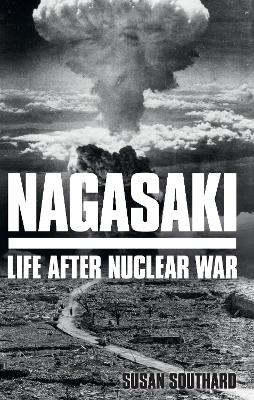
Nagasaki
Souvenir Press Ltd (Verlag)
978-0-285-64327-7 (ISBN)
- Titel ist leider vergriffen;
keine Neuauflage - Artikel merken
Chosen as one of the Washington Post's most notable non-fiction books of 2015.
On August 9th, 1945, the US dropped an atomic bomb on Nagasaki.
It killed a third of the population instantly, and the survivors, or hibakusha, would be affected by the life-altering medical conditions caused by the radiation for the rest of their lives. They were also marked with the stigma of their exposure to radiation, and fears of the consequences for their children.
Nagasaki follows the previously unknown stories of five survivors and their families, from 1945 to the present day. It captures the full range of pain, fear, bravery and compassion unleashed by the destruction of a city.
Susan Southard has interviewed the hibakusha over many years and her intimate portraits of their lives show the consequences of nuclear war. Nagasaki tells the neglected story of life after nuclear war and will help shape public debate over one of the most controversial wartime acts in history.
On August 9th, 1945, three days after the atomic bombing of Hiroshima, a 5-tonne plutonium bomb was dropped on the small, coastal city of Nagasaki. The explosion destroyed factories, shops and homes and killed 74,000 people while injuring another 75,000. The two atomic bombs marked the end of a global war but for the tens of thousands of survivors it was the beginning of a new life marked with the stigma of being hibakusha (atomic bomb-affected people). Susan Southard has spent a decade interviewing and researching the lives of the hibakusha, raw, emotive eye-witness accounts, which reconstruct the days, months and years after the bombing, the isolation of their hospitalisation and recovery, the difficulty of re-entering daily life and the enduring impact of life as the only people in history who have lived through a nuclear attack and its aftermath. Following five teenage survivors from 1945 to the present day Southard unveils the lives they have led, their injuries in the annihilation of the bomb, the dozens of radiation-related cancers and illnesses they have suffered, the humiliating and frightening choices about marriage they were forced into as a result of their fears of the genetic diseases that may be passed through their families for generations to come.
The power of Nagasaki lies in the detail of the survivors' stories, as deaths continued for decades because of the radiation contamination, which caused various forms of cancer. Intimate and compassionate, while being grounded in historical research Nagasaki reveals the censorship that kept the suffering endured by the hibakusha hidden around the world. For years after the bombings news reports and scientific research were censored by U.S. occupation forces and the U.S. government led an efficient campaign to justify the necessity and morality of dropping the bombs. As we pass the seventieth anniversary of the only atomic bomb attacks in history Susan Southard captures the full range of pain, fear, bravery and compassion unleashed by the destruction of a city. The personal stories of those who survived beneath the mushroom clouds will transform the abstract perception of nuclear war into a visceral human experience.
Susan Southard's first book, Nagasaki: Life After Nuclear War (2015) received the Dayton Literary Peace Prize in Nonfiction and the J. Anthony Lukas Book Prize, sponsored by the Columbia School of Journalism and Harvard University's Nieman Foundation for Journalism, and was also named a best book of the year by the Washington Post, Economist, Kirkus Reviews, and the American Library Association. Nagasaki has been published in England, Spain, Denmark, China, Taiwan, and Japan, and excerpts of the book have appeared in journals around the world. Southard's work has also appeared in the New York Times, the Los Angeles Times, Politico, and Lapham's Quarterly. She holds an MFA in creative writing from Antioch University, Los Angeles, and was a nonfiction fellow at the Norman Mailer Center in Provincetown, Massachusetts. Southard presents keynote addresses and lectures at international disarmament conferences, universities, and public forums across the United States and abroad. In 2016, she spoke before the United Nations on behalf of the International Campaign to Abolish Nuclear Weapons (ICAN), which won the 2017 Nobel Peace Prize. Southard teaches graduate-level nonfiction seminars and has directed creative writing programs for incarcerated youth and at a federal prison for women outside Phoenix. She is the founder and artistic director of the Phoenix-based Essential Theatre, a professional company now in its 30th season serving marginalized communities across the Southwest.
| Erscheint lt. Verlag | 9.11.2015 |
|---|---|
| Sprache | englisch |
| Maße | 140 x 225 mm |
| Gewicht | 610 g |
| Themenwelt | Geschichte ► Allgemeine Geschichte ► 1918 bis 1945 |
| Geschichte ► Allgemeine Geschichte ► Zeitgeschichte | |
| Geisteswissenschaften ► Geschichte ► Regional- / Ländergeschichte | |
| Geschichte ► Teilgebiete der Geschichte ► Kulturgeschichte | |
| Geschichte ► Teilgebiete der Geschichte ► Militärgeschichte | |
| Sozialwissenschaften ► Politik / Verwaltung | |
| ISBN-10 | 0-285-64327-4 / 0285643274 |
| ISBN-13 | 978-0-285-64327-7 / 9780285643277 |
| Zustand | Neuware |
| Haben Sie eine Frage zum Produkt? |
aus dem Bereich


